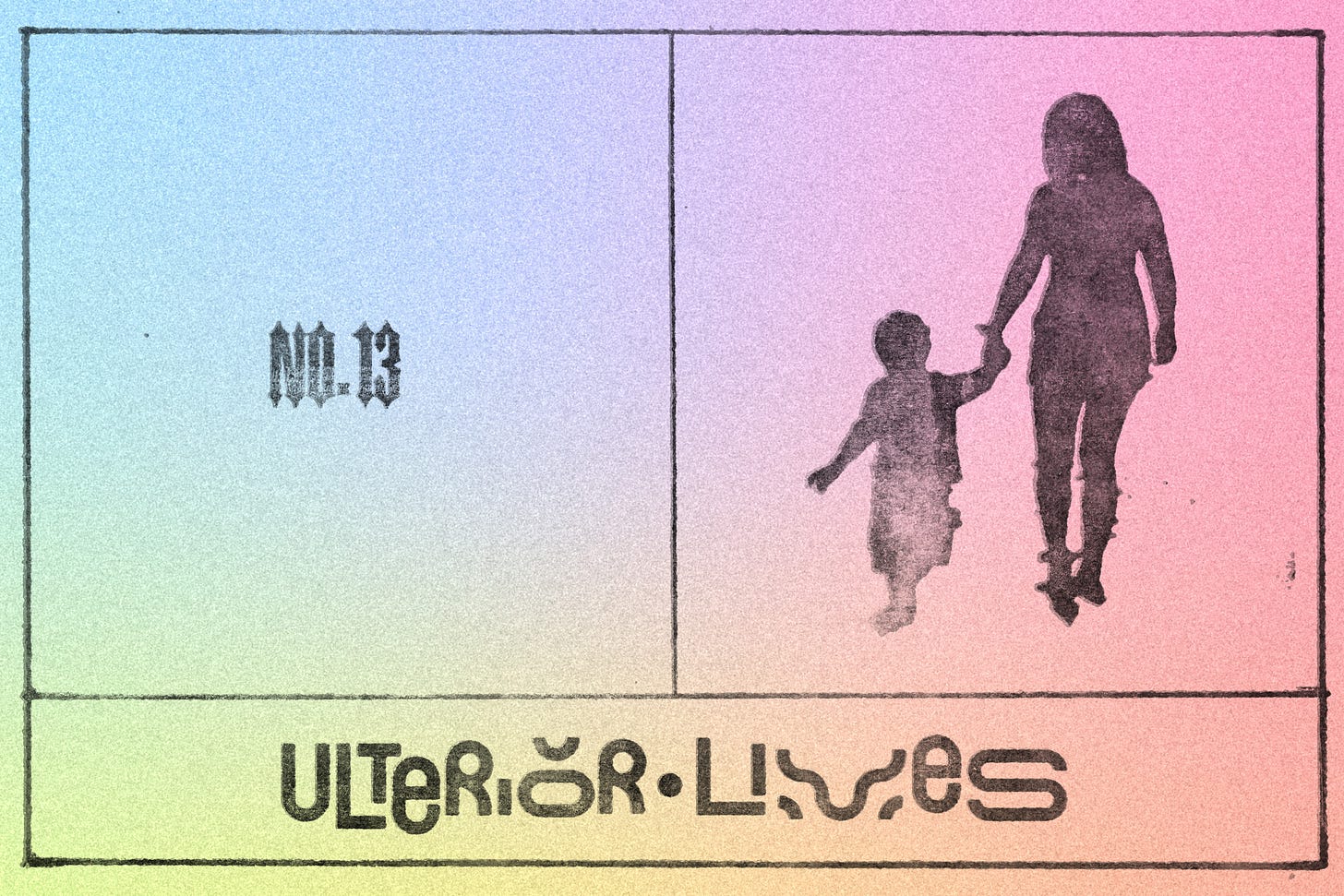On the absence of children
On the face of it, the most long-running anarchist commune in Western history had no investment in what it was building: the end was wired in.
Part 13 of our Ulterior Lives series: A Slow Research Project into The Outsider Politics of Monasticism. Read the introduction here.
A tale is told of an elderly and sickly hermit who decides to leave the desert community in Scetis. He returns to Egypt, fearing that he has been a burden to the other monks. In Egypt, he is cared for by a pious woman and recovers. More still, they have a relationship and she becomes pregnant. The tale is rather beautiful. If it appeared in the book of Genesis it would probably read as an image of life, joy, fruitfulness. But the hermit doesn't see it this way; he understands himself to have fallen from grace.
“When the baby had been weaned, the hermit carried it on his shoulders, and arrived in Scetis on a feast day; he went into the church in front of all the brothers. When they saw him, they wept. He said to them, ‘Do you see this baby? He is the child of disobedience. Beware, my brothers, remember what I have done though I am old, and pray for me.’ Going into his cell, he returned to his old way of life.”
A number of posts back, my friend Andrew asked, “What about those children? I can't hear any scrambling in the shade…”. Indeed. This is one of very few tales from the desert involving a child. Those that exist are the self-declared exception to the norm.
I am not well read in the histories by which this came to be an assumed position, or a Christian ideal. There are, of course, several acknowledgments in the New Testament of those who choose to live celibate lives, but no normative rule or pattern. Why was the matter of family so ubiquitously nailed down? Why the hard no? Since there was, initially, no written rule, and since one hermit to next formed their own ascetic path and their own boundaries of devotion, why was there not a mixture of approaches on the matter of family and children?
I certainly find the tale above morally unsettling. Was the boy’s mother at peace with being separated from her son? Did she have a choice? Would the boy be raised to adulthood under that mantle: a child of disobedience? It seems destructive in so many directions. It is difficult not to read into this story, and others like it, a religiously-driven contempt for the creaturely nature of sexuality and reproduction. But this is a slow research project, and I’m quite ignorant of the histories that made this a settled matter by the time of the hermits. Suggestions toward helpful material on the subject will be gratefully received.
I have been asking whether hermetic life is a sustainable political economy. The consensus against familial relations of any kind points to the obvious conclusion that this pattern of life was not sustainable, and had no intention of being sustainable. It is, once again, astonishing that it lasted as long as it did. The two questions on my mind are these: how to understand a pattern of life that refuses to reproduce itself; and how to understand its surprising longevity in spite of the strange rule?
Another tale begins like so:
“Two brothers who were attacked by lust went away and married wives. Afterwards they said to each other, ‘what have we done? We have ceased to live like angels and have lost purity, and later on we will come to fire and torment. Let us go back to the desert, and do penance for our fault.’”
And so they leave their marriages and return to the desert to do penance, remaining in their cells for one full year.
It would seem that fleeing the world meant fleeing the family. Perhaps because the intensity of the relationship they held with their own souls was rightly deemed impossible in the complex relational realm of the family. The hermits practiced a recklessness with themselves that would not be possible alongside those commitments. Perhaps it was because the Messiah had once said that, in the age to come, people would not be married but would be like the angels. Perhaps, as is often suggested, sex was simply too confusing and terrifying for the religious imagination as it had developed.
What is notable within the scope of this research project is a compelling and audacious irony. The most long-running anarchist commune in Western history lacked a well thought through social/political theory by which it might plot its best path to success: not only that, but it kept strictly to a form of life that denied the possibility of its own social reproduction. They had no such investment in what they were building. They left no trace. Its end was wired into it, and whatever bond was between them all, it was not of genealogies and bloodlines but rather the choice that one makes toward the other, every day.
I am certainly not at peace with the subject. I've no interest in defending it or advocating for it in any sweeping fashion. I do, however, sense in the madness something the philosopher Giorgio Agamben called destituent life. Western civilisation seeks constitution wherever it goes. It wants to make fortress-like structures against time: to put a flag in the soil, build a city, form a law, institute a government. De-stituent life on the other hand unmakes itself as it goes, like plant-life, like the animals.
Our final two Issues of Passio Magazine (#14 + #15) are still available in our shop in paper form! Our other back-issues are now all sold out, but you can get a digital PDF of any issue at half the price 🙂







